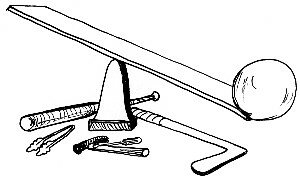STRANGE BUT TRUE- Give me a...: Our body is made of levers

Q. You don't need an engineering degree to figure out the common denominator here, but it wouldn't hurt: Tongs, scissors, staplers, nutcrackers, bottle openers, nail clippers, tweezers, hammer claws, can-openers, screwdrivers, pliers, car-jacks, light switches. Need more? Add in see- saws, baseball bats, golf clubs, fishing rods, hockey sticks. Archimedes, exaggerating somewhat, said if he had a big enough model of this and a place to anchor it, he could move the Earth. Got it now? –I. Newton
A. All incorporate some form of lever, says Steven Vogel in Cats' Paws and Catapults. Levers are simple "machines" consisting of a stiff rod, a load, and an effort. As such, they're older than humanity, used even by chimps when they "fish" termites out of their nest with twigs. Your body itself has built-in bony levers, without which you'd hardly be able to gain leverage to move about.
Q. With a name like Virginia Flowers, would you be more likely to move to Virginia and to become a florist? –I. M. Hogg
A. Can you believe the answer is a statistical "yes." We don't just like ourselves– we like what we associate with ourselves, including our own name. Brett Pelham, Matthew Mirenberg and John Jones have termed this "implicit egotism," says David G. Myers in Social Psychology. For
instance, women named Georgia are disproportionately likely to move to Georgia, as are Virginias to Virginia. And St. Louis has a 49 percent excess (relative to the national proportion)
of men named Louis.
Amazingly, this applies to last names as well, the clincher that people don't just do egotistic baby-naming but actually move to their place names! California, for instance, has a disproportionate number of Cali's, as in Califano; Toronto has excess Tor's. So it's no surprise
that Hills, Rocks, Lakes and Parks tend to live in places such as Park City.
"Weirder yet– I am not making this up– people seem to prefer careers related to their names," says Myers. Across the U.S., Jerry, Dennis, and Walter are equally popular (0.42 percent each), yet America's dentists are almost twice as likely to be named Dennis. And there are 2.5 times as many Denise dentists as Beverlys or Tammys, equally popular names. Georges and Geoffreys become geophysicists, geologists, geochemists. "And in the 2000 presidential campaign, people with last names beginning with B and G were more likely to contribute to the campaigns of Bush and Gore respectively," he says.
Q. If winter daylight deprivation can bring on SAD (seasonal affective disorder) and depression, what might happen to someone stationed at the North Pole, where night lasts for six months? –S. Claus
A. Coping there in winter is indeed overwhelmingly difficult–just read Admiral Perry's diaries, says the Center for Environmental Therapeutics, in New York. Not only is depression a major problem for those vulnerable to SAD, but maintaining a regular sleep-wake schedule is nearly
impossible for many people, especially kids. Northern Scandinavians call this "midwinter insomnia." Luckily, timed artificial lighting can help serve as the brain's early-morning sunrise signal.
A fascinating fact is that while alcoholism is common in Alaska, Russia, and Finland, native Icelanders do not have SAD even if they move elsewhere, says University of Minnesota psychiatrist Barry Rittberg, MD. Theirs was a genetically isolated population for hundreds of years, so the genes responsible for SAD were eliminated due to decreased offspring for those who got depressed and lost interest in sex, or who maybe even committed suicide.
Q. You know that 1 + 0 = 1, 1 - 0 = 1, and 1 x 0 = 0. So what does 1/0 (1 divided by 0) equal? And a related question, when does Wayne Newton become the Pope? –Benedict XVI
A. Dividing by 0 would bring on the "nonsense" cops because in our mathematical system, this gives an answer that doesn't make sense, says Ithaca College's Aaron Weinberg. To see why, check out the following progression: 1 divided by 1 = 1; 1 divided by 1/2 = 2; 1 divided by 1/3 =
3 ... 1 divided by 1/100 = 100 ... 1 divided by 1/1000 = 1000 ... The smaller you make the divisor, the bigger the answer becomes, until as you approach 0, it grows too enormous to even write on the page. Try to divide by 0 itself and the answer becomes infinity, which if treated like an ordinary number leads to some mighty strange things.
How strange? If 1/0 equals infinity, then so does 2/0. Which means 1/0 = 2/0, and since the denominators here are the same, you can conclude that 1 = 2. It gets better, says Weinberg. "We know that Wayne Newton is 1 person. The Pope is also 1 person, so together they're 2 people. But since 2 = 1, this also means that Wayne Newton and the Pope are 1 person, so Wayne Newton must be the Pope!"
Send Strange questions to brothers Bill and Rich at [email protected].
#